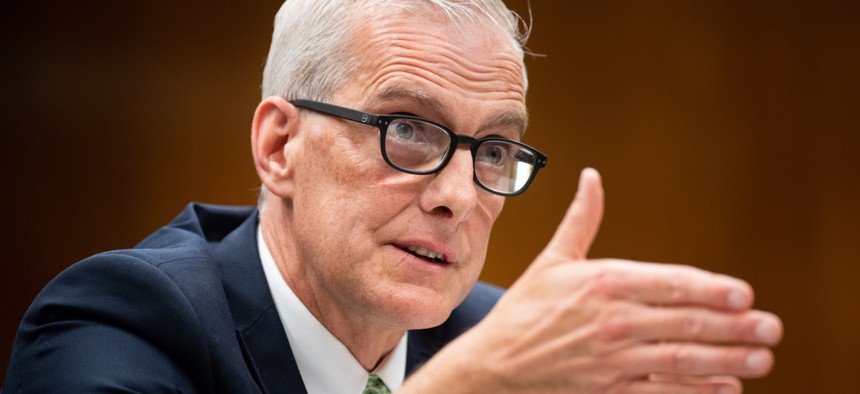
Veterans Affairs Secretary Denis McDonough told the House Appropriations Subcommittee on Military Construction, Veterans Affairs and Related Agencies Tuesday that the department is continuing PACT Act outreach to veterans. Bill Clark / Getty Images
VA is trimming its PACT Act claims backlog, but enrollees may be on the ‘low side’
Veterans Affairs Secretary Denis McDonough says that the department is quickly processing new claims made by veterans exposed to toxic substances during their military service, thanks, in part, to robust hiring, but warns that those claims may not have hit their peak yet.
The Veterans Affairs Department is quickly outpacing its expectations for processing new claims made through a law designed to provide health care coverage to veterans exposed to toxic substances, but Secretary Denis McDonough said Tuesday there may be more to come.
Testifying before the House Appropriations Subcommittee on Military Construction, Veterans Affairs and Related Agencies Tuesday, McDonough said the department has been managing the influx of claims from new benefits eligibility made possible by the PACT Act, but that also possible that the VA has not seen the high-water mark of those claims yet.
“Interestingly, the question for us is when do we peak on the inventory,” he said. “We are actually beating our assessment on the backlog and the inventory. That’s because we think there was more aggressive enrollment in the submission of claims last summer.
“So what we thought was going to be a series of claims spread out over the course of this calendar year actually got compressed,” he added. “And because we’ve been able to hire more quickly — another positive of the PACT Act — those numbers have been coming down faster.”
The PACT Act opened VA benefits eligibility to veterans exposed to burn pits overseas, acting alongside new VA regulations to expand the presumed coverage area where Vietnam veterans may have been exposed to herbicide agents commonly known as Agent Orange.
To prepare for a deluge in new claims from newly eligible veterans, the VA went on a hiring spree. Using recruitment and retention incentives included in the law, the Veterans Health Administration added a 5.5% increase to its workforce in 2023 alone.
McDonough said that 1.3 million claims tied to PACT Act benefits have been filed thus far, with 900,000 in the inventory. Of those, 330,000 are considered backlogged, meaning that it has taken more than 125 days to resolve all contentions related to the claim.
The secretary added that he estimates that the backlog will be down to 50,000 claims by December 2025, adding that average days to completion are 17 days faster than a year ago.
However, McDonough noted that with those positives, it’s also possible that veterans aren’t yet aware of the new coverage they are able to access.
“To be honest, I think the enrollees are on the low side of what we might have expected,” he said.
To help ensure that PACT Act-eligible veterans are aware of their potential health benefits, the secretary said the VA will have 550 outreach events scheduled this year alone and is also using text-based communication campaigns to help spread information about the programs.
McDonough also said that current projections for the Veterans Benefits Administration estimate smaller workforce growth by the end of 2025, with the expectation that the surge of PACT Act claims will be addressed by then.
Indeed, the VA has already projected to lose 10,000 employees in fiscal 2025, largely through attrition, with the VHA expecting to trim its workforce by 4%.
Outside of the PACT Act, McDonough said that a mix of new hires and expanded telehealth availability have helped the VA see 25,000 more new patients in its direct care system between October 2023 and February 2024.
“We did that by offering more convenient and accessible care options for vets, evening appointments, weekend appointments, and we are working to sustain those options now,” he said.







